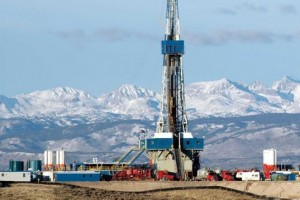
The office of Javier Fernández, head of the Cantabrian government’s environmental department, offers a spectacular view across the bay of Santander and the rolling sea beyond.
As he points it out, he proudly makes a broader point about Cantabria: it may be one of Spain’s smallest regions, but its countryside is unusually dramatic, ranging from a ragged coastline and unique rock formations explored by cavers, to snow-capped mountains prized by climbers.
“This region has special values, both in terms of the landscape and the environment,” he says.
Fernández explains that those natural values are what drove the region’s government to propose a law making the region Spain’s first to prohibit the controversial practice of hydraulic fracturing. In April, the Cantabrian parliament voted unanimously in favour of the ban.
“Fracking”, as it is commonly known, involves the pumping of liquids deep below the earth’s surface in order to extract shale gas.
The debate on its impact is very much alive across Europe. Environmentalists say it is risky, contaminating water basins and even, in some cases, causing seismic activity. In Cantabria, environmentalists say that the region’s highly porous rock makes water pollution more likely.
Although the UK recently lifted a moratorium, France and Bulgaria have banned fracking.
“Given all the question marks hanging over this method of extracting unconventional gas, we had to weigh up what fracking would mean in economic and industrial terms against the need to defend the region’s landscape,” Fernández says.
While the landscape won, those economic and industrial terms were hard to ignore.
The Spanish energy industry estimates that €100 million of investment were ready to be poured into Cantabria related to exploration for shale gas alone. The ensuing extraction of the fuel would then have brought much more money, a tempting prospect given that Spain is deep in recession, with a jobless rate of 27 percent.
But energy companies that had been issued with shale gas exploration licences in Cantabria prior to the new law are now unable to proceed with their research. BNK is one such firm, having committed €20 million to exploration in the region.
“Cantabrians have a very historic opportunity to develop an industry where they probably have important resources,” says BNK’s corporate director in Spain, Juan Carlos Muñoz, from his office in Madrid.
He insists hydraulic fracturing is environmentally safe and sees the new law as a populist attempt to please voters.
“(The law) is not based on technical reasons, it’s not supported by technical studies from the authorities or from independent companies,” he says. “It’s only been developed for political reasons.”
Advocates of fracking also point out that Spain imports over three-quarters of its energy needs. Shale gas could offer a substantial supply of home-produced fuel.
But neither the economic arguments nor the insistence by the industry that hydraulic fracturing is less risky than it is portrayed seem to have convinced locals. Grass roots activism against fracking in Cantabria has swelled. Its effectiveness can be heard in ordinary Cantabrians’ opposition to shale gas extraction, and seen in the anti-fracking graffiti daubed on bridges and walls across the region.
The battle lines are clear: environmentalists, backed by local politicians, see large energy firms seeking to make money at the cost of a cherished landscape and a deeply traditional rural lifestyle; the industry, meanwhile, alleges that misinformation has allowed anti-fracking to become a fashionable cause, both among ordinary people and their political representatives.
And yet both sides do seem to agree on one thing: the Cantabrian fracking ban might not last long.
“We’re celebrating the law because hydraulic fracturing is a very risky technique that should be forbidden in every country,” says Josué Bilbao, an anti-fracking activist. “But we are worried that the central government in Madrid could try to make this ban invalid.”
BNK also thinks the law could be rolled back. The reason is that although both Cantabria and Spain as a whole are governed by the conservative Partido Popular (PP), the regional and central administrations don’t see eye-to-eye on fracking. The central government is now preparing an energy law to allow the practice nationwide.
In late April, the secretary of state for energy, Alberto Nadal, warned that the central government can overrule regional administrations in areas such as fracking, “because hydrocarbon reserves are a strategic issue that affects the country as a whole.”
If the central government follows through on its announced plan to bring hydraulic fracturing to Spain, then the historic ban by Cantabria’s anti-fracking rebels could be very short-lived. And the region’s treasured countryside could soon look very different.
Leave a Reply
You must be logged in to post a comment.